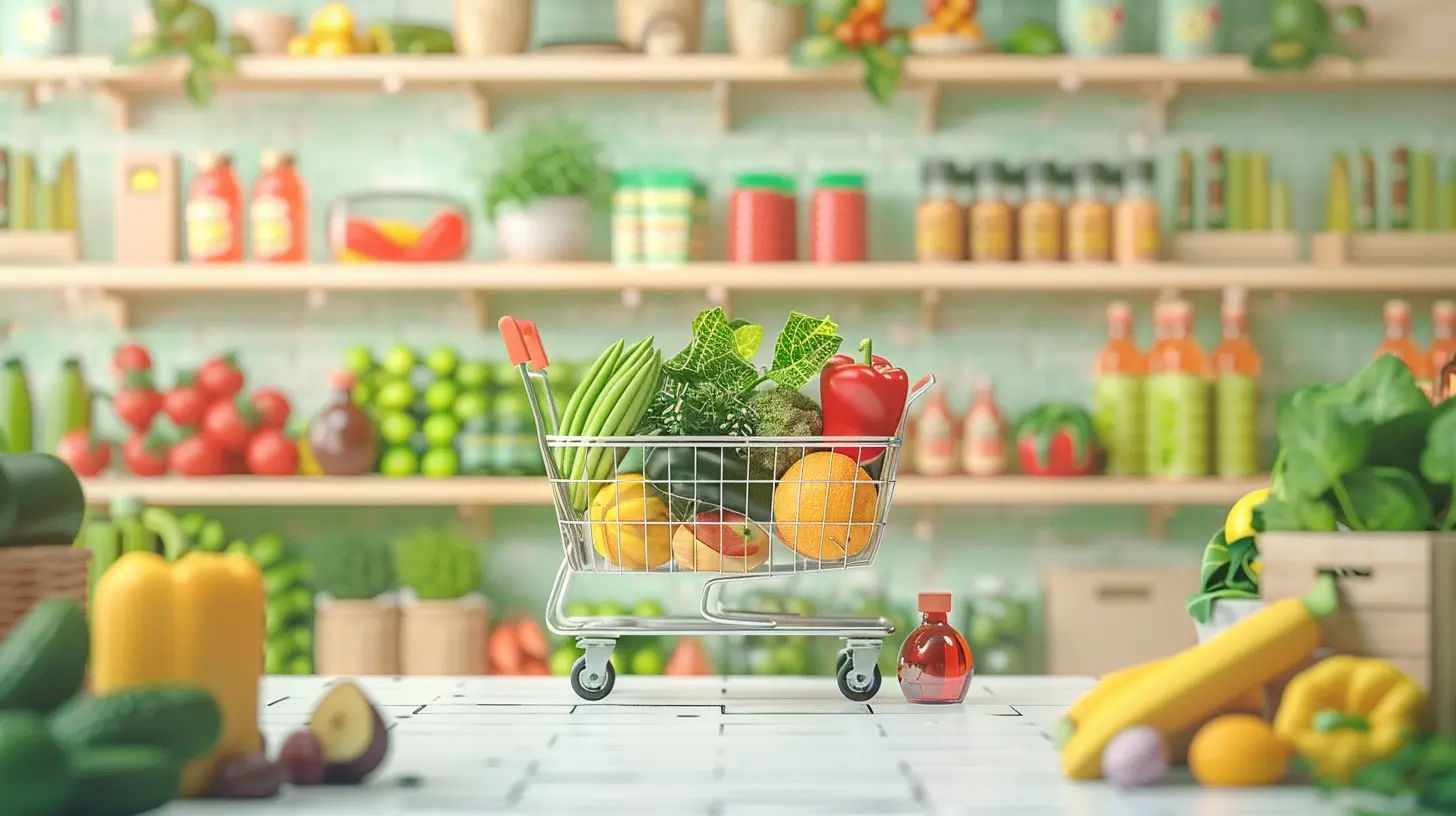Eco-Friendly Grocery Shopping for Plant-Based Diet Enthusiasts
10 October 2025
If you're all about living that plant-based life, chances are you care about your impact on the planet, too. And honestly? That’s awesome. One of the simplest yet most powerful ways we can contribute to a healthier planet and a cruelty-free lifestyle is by making conscious choices where we shop for food — yep, the humble grocery store run can be a game-changer!
So let’s chat about how to turn your weekly food shopping into an eco-conscious mission without the stress. Whether you’re a seasoned vegan or just dipping your toes into plant-based waters, this guide is for you. We’ll cover everything from picking the right products to reducing waste, all while making sure your pantry stays full of healthy, nourishing foods.

Why Eco-Friendly Grocery Shopping Matters
Okay, real talk: the food industry has a huge environmental footprint. Between plastic packaging, food miles, agricultural emissions, and waste... things can get a little dicey for Mother Earth.But here's the good news — when you choose to eat plant-based, you're already slashing your carbon footprint. Now, combine that with eco-friendly shopping habits, and you’ve got yourself a double win. Think of yourself as a green superhero in the produce aisle. 🦸♀️🥦

1. Make a Plan Before You Shop
Let’s be real — impulse buying is tempting. That new plant-based snack you saw on Instagram? Into the cart it goes. But planning ahead helps you avoid unnecessary purchases, reduces waste, and saves you money.Write a simple list of what you actually need. Try organizing it by categories — fruits, veggies, grains, snacks, etc. And don’t forget to check your fridge and pantry first so you're not stocking up on something you already have.
Pro Tip: Use a meal planner app or even good ol’ pen and paper. Planning your meals ahead of time keeps you focused and reduces food waste.

2. Shop Local (and Seasonal)
Who doesn’t love a juicy peach in the summer or crisp kale in the fall? Choosing locally grown, seasonal produce supports small farmers and cuts down on transportation emissions.Ever thought about hitting up your local farmers' market? It's one of the best places to score fresh, organic produce without all the excess packaging. Plus, it's a great way to connect with the community and learn where your food comes from.
Bonus Points: Bring your own bags and containers. You’ll reduce plastic usage and probably earn a few eco-karma points.

3. Embrace Bulk Buying
Bulk bins are a plant-based shopper’s playground. Think grains, beans, nuts, seeds, dried fruit — the works! Not only is it often cheaper, but you also get to skip the plastic packaging that comes with individual items.All you need are a few reusable jars or cloth bags. Pro tip: jot down the item codes on your phone or a sticky note to save time at checkout.
Heads up: Not every store offers bulk sections, but natural food stores and co-ops usually have them. It’s worth seeking out one in your area.
4. Choose Products with Minimal Packaging
Packaging is basically the unwanted house guest of grocery shopping — it lingers long after the food is gone. Fortunately, there are ways to avoid the excess:- Opt for glass or cardboard over plastic.
- Avoid single-use items.
- Look for brands using compostable or recyclable packaging.
If you have to choose packaged food (and let’s be real, sometimes you do), go for brands that at least try to make eco-packing part of their mission. They’re out there!
5. Go Organic When Possible
We get it — organic can be pricey. But it’s not always about going 100% organic; it’s about making better choices when you can. Organic farming typically avoids synthetic pesticides and fertilizers, which is better for the soil, water, and wildlife.A good strategy? Check out the EWG’s Dirty Dozen and Clean Fifteen lists. They tell you which fruits and veggies you should prioritize buying organic and which ones are fine conventionally grown.
6. Say Goodbye to Plastic Bags
This one’s a no-brainer. Always carry reusable shopping bags. Keep a couple in your car, purse, or even your backpack so you’re never caught empty-handed.And don’t stop there — reusable produce bags are clutch. No one needs 10 plastic bags for their apples, bananas, and sweet potatoes.
Bonus Tip: Mesh laundry bags work wonders if you’re in a pinch. Yep, that’s a thing.
7. Support Sustainable Brands
If you’re vegan or plant-based, you’re already tuned in to reading ingredient labels. Go one step further and look into the brand’s sustainability practices.Ask questions like:
- Do they use ethically sourced ingredients?
- Do they support regenerative farming?
- Are they transparent about their carbon footprint?
More companies are blending plant-based nutrition with planet-friendly ethics. By supporting them, you’re voting with your dollars.
8. Choose Organic or Plant-Based Cleaning Products
Eco-friendly shopping doesn’t end at the produce aisle. Think about all the non-food items that end up in your cart: dish soap, laundry detergent, and surface cleaners.Opt for products that are plant-based, non-toxic, and biodegradable. Brands like Seventh Generation, Ecover, or even DIY cleaning hacks using vinegar and lemon (yes, your grandma was right!) can significantly reduce your chemical load and plastic waste.
9. Try a Zero-Waste Lifestyle — One Step at a Time
Zero waste can sound intimidating, but it doesn’t have to be all or nothing. Try swapping one item at a time, like switching from bottled plant milk to homemade oat milk. Sound scary? It’s easier than you think — oats, water, blender, done.Other small but mighty swaps:
- Use beeswax wraps instead of plastic wrap.
- Ditch paper towels for reusable cloths.
- Store foods in jars instead of plastic containers.
Little changes add up over time, trust me.
10. Compost What You Don’t Eat
Even the best meal planners end up with scraps. Instead of sending those to the landfill (where they turn into methane), start composting!Whether you have a backyard bin or a countertop compost system, turning food waste into nutrient-rich soil closes the loop. Some cities even offer composting services, so check with your local government or co-op.
If you’re tight on space, there are even odor-free indoor composting systems. No excuse not to give it a shot!
11. Read Labels Like a Pro
Plant-based doesn’t always mean eco-friendly. Some foods are highly processed, shipped from across the world, and packaged in not-so-earth-friendly materials.When reading labels, dig a little deeper:
- Where is the product made?
- Are ingredients whole and minimally processed?
- Is the company part of any sustainability alliances?
The more informed you are, the easier it is to make choices that support your values.
12. Reuse and Repurpose
Before you toss containers or jars, ask yourself: “Can I use this for something else?” Peanut butter jars make killer overnight oats containers. Glass sauce jars transform into pantry storage. It’s like giving your trash a second chance at life — talk about redemption arcs!
13. Support Grocery Stores That Care
Some grocery chains are doing a better job than others when it comes to sustainability. Co-ops, natural food stores, and even some big-name chains are stepping up their green game. Look for stores that:- Offer incentives for bringing your own bags
- Promote local produce
- Partner with eco-conscious brands
Shopping at the right places makes your job a whole lot easier.
14. Buy Less, Waste Less
Yep, it's that simple. Around 30-40% of the food supply in the U.S. gets wasted. That’s like going grocery shopping and throwing away a third of your haul as soon as you get home. Wild, right?So, buy only what you’ll use. Use your freezer for leftovers, repurpose meals, and get creative in the kitchen.
Spoiler alert: that wilting kale and aging tomato can make a mean soup or stir-fry.
Final Thoughts
Eco-friendly grocery shopping doesn’t require a complete lifestyle overhaul or hours of research every week. It’s about forming simple habits, making mindful choices, and doing a little better each time. You’re not just feeding yourself — you’re feeding a movement toward a cleaner, kinder planet.And hey, if you mess up and buy some tofu in plastic packaging, don’t beat yourself up. Sustainability isn’t about perfection — it’s about progress. Every small step in the right direction counts, and you’re already way ahead of the curve just by being aware.
Grab your tote bag, fill your shopping list with plant-powered staples, and own that eco-friendly lifestyle. The planet (and your taste buds) will thank you.
all images in this post were generated using AI tools
Category:
Plant Based DietAuthor:

Tiffany Foster
Discussion
rate this article
1 comments
Ashira Becker
Great article! Emphasizing eco-friendly options in grocery shopping not only supports a plant-based diet but also promotes sustainability. Small changes can make a big difference in our health and the planet!
October 18, 2025 at 2:25 AM

Tiffany Foster
Thank you for your kind words! I'm glad you found the article helpful in promoting sustainable grocery shopping for a healthier planet. Every small change counts!


